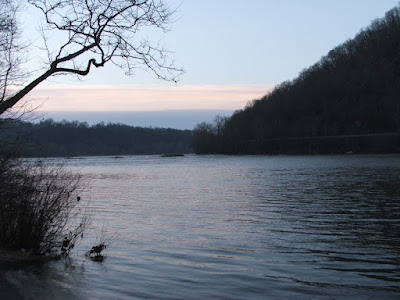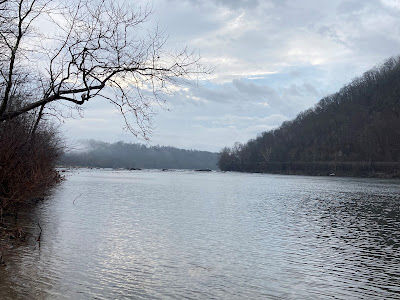Sections below are the following:
Transcript of Audio
Audio Notes and Acknowledgments
Images
Extra Information
Sources
Related Water Radio Episodes
For Virginia Teachers (Relevant SOLs, etc.).
Unless otherwise noted, all Web addresses mentioned were functional as of 12-31-21.
TRANSCRIPT OF AUDIO
From the Cumberland Gap to the Atlantic Ocean, this is Virginia Water Radio for the week of January 3, 2022. This revised episode from January 2014 is part of a series this year of winter-related episodes.
For this first week of 2022, we listen in on one Virginian’s annual New Year’s challenge to the laws of physics and chemistry—water-temperature physics and chemistry, that is. Have a listen for about 35 seconds.
SOUNDS AND VOICE - ~35 sec – “It’s the New Year, on the shore of the New River. It’s 22 degrees and perfect time for a swim. Happy New Year, everyone! Happy New Year! [Series of exclamations about the cold.] Ah, welcome to Antarctica.”
You’ve been listening to Blacksburg resident Alan Moore during the 2014 version of his annual New Year’s Day wade into the New River. The watery welcome to that January 1st—unaided by a wet-suit—lasted only a few seconds, not as much because of the 22-degree air temperature as because of the 39-degree water temperature. Water that cold can cause exhaustion or unconsciousness within 15 to 30 minutes, and even water at 60 or 70 degrees can be dangerously chilling over one to two hours, depending on a person’s body size and other factors.
Water’s capacity to chill a human body is much greater than that of air at the same temperature, for two reasons. First, liquids generally conduct heat more rapidly than gases, because liquids are denser (that is, the molecules are closer together). And second, liquid water has chemical attractions between molecules that can absorb high amounts of energy, such as heat energy coming from a person’s body. These and other interactions among water, heat, and temperature are part of water’s thermodynamics, and they exert a big influence on weather, aquatic environments, biology, and taking a plunge on New Year’s or any other day.
Thanks to Alan Moore for lending his voice and wade-in sounds to this episode. We close this first episode of the New Year with about 45 seconds of music to give a hydrological hello to 2022. Here’s “New Year’s Water,” by Torrin Hallett, a graduate student at the Yale School of Music.
MUSIC - ~46 sec – instrumental.
SHIP’S BELL
Virginia Water Radio is produced by the Virginia Water Resources Research Center, part of Virginia Tech’s College of Natural Resources and Environment. For more Virginia water sounds, music, or information, visit us online at virginiawaterradio.org, or call the Water Center at (540) 231-5624. Thanks to Stewart Scales for his banjo version of Cripple Creek to open and close this episode. In Blacksburg, I’m Alan Raflo, thanking you for listening, and wishing you health, wisdom, and good water.
AUDIO NOTES AND ACKNOWLEDGEMENTS
This Virginia Water Radio episode revises and replaces Episode 195, 1-6-14.
Thanks to Alan Moore for allowing Virginia Water Radio to record sounds during his annual New River wade-in on January 1, 2014.
“New Year’s Water” is copyright 2016 by Torrin Hallett, used with permission. Thanks very much to Torrin for composing the piece especially for Virginia Water Radio. Torrin is a 2018 graduate of Oberlin College and Conservatory in Oberlin, Ohio; a 2020 graduate in Horn Performance from Manhattan School of Music in New York; and a 2021 graduate of the Lamont School of Music at the University of Denver. He is currently a graduate student at the Yale School of Music. More information about Torrin is available online at https://www.facebook.com/torrin.hallett. This music was used previously by Virginia Water Radio in Episode 349, 1-2-17.
Click here if you’d like to hear the full version (1 min./11 sec.) of the “Cripple Creek” arrangement/performance by Stewart Scales that opens and closes this episode. More information about Mr. Scales and the group New Standard, with which Mr. Scales plays, is available online at http://newstandardbluegrass.com.
IMAGES


Two photos of the New River near the county line between Giles and Montgomery counties in Virginia, looking upstream: At dawn on January 1, 2014 (upper photo) and at 8:40 a.m. on January 1, 2022 (lower photo).
EXTRA INFORMATION ABOUT COLD WATER SAFETY
The following is quoted from the National Weather Service, “Cold Water Hazards and Safety,” online at https://www.weather.gov/safety/coldwater.
“Warm air doesn’t always mean warm water in lakes, streams or oceans. Fifty-five degree water may not sound very cold, but it can be deadly. Plunging into cold water of any temperature becomes dangerous if you aren’t prepared for what the sudden exposure can do to your body and brain. Warm air temperatures can create a false sense of security for boaters and beach goers, so if you are planning to be on or near the water, arrive knowing the conditions and how to protect yourself. Cold water drains body heat up to 4 times faster than cold air. When your body hits cold water, “cold shock” can cause dramatic changes in breathing, heart rate and blood pressure. The sudden gasp and rapid breathing alone creates a greater risk of drowning even for confident swimmers in calm waters. In rougher open water this danger increases. Unplanned immersion in cold water can be life-threatening for anyone without protection from the temperatures or a lifejacket to help you stay afloat. When Cold Shock and Hypothermia begin to impact your ability to think and act, life jackets and flotation can create extra time for help to arrive or for you to get out of danger. Even the most experienced cold water surfers, swimmers or boaters know to prepare for the conditions.”
SOURCES
Used for Audio
Encyclopedia Britannica, “Thermodynamics,” online at https://www.britannica.com/science/thermodynamics.
J. J. Hidore and J. E. Oliver, Climatology—An Atmospheric Science, MacMillian, New York, 1993, pages 55-58.
Linus Pauling, General Chemistry, Dover, New York, 1970, pages 343-350.
On survival in cold water:
National Weather Service, “Cold Water Safety,” online at https://www.weather.gov/safety/coldwater.
University of Minnesota Sea Grant, “Hypothermia Prevention: Survival in Cold Water,” at http://www.seagrant.umn.edu/coastal_communities/hypothermia; see the site’s “How Long Have I Got?” section for information on how long one can survive being immersed in cold water.
For More Information about Cold Weather Safety, Hypothermia, and Frostbite
National Weather Service, “Cold Weather Safety,” online at https://www.weather.gov/safety/cold.
U.S. Centers for Disease Control and Prevention, “Prevent Hypothermia & Frostbite,” online at https://www.cdc.gov/disasters/winter/staysafe/hypothermia.html.
Virginia Department of Health, “Newsroom/Winter Weather Preparedness,” at https://www.vdh.virginia.gov/news/public-relations-contacts/winter-weather-preparedness/.
RELATED VIRGINIA WATER RADIO EPISODES
All Water Radio episodes are listed by category at the Index link above (http://www.virginiawaterradio.org/p/index.html). See particularly the “Science” and “Weather/Climate/Natural Disasters” subject categories.
Following are links to other episodes that focus on an incoming New Year.
Episode 296, 12-28-15 – Setting a Course for 2016 with ‘On a Ship’ by Kat Mills.
Episode 349, 1-2-17 – Water for a World of New Years, Featuring “New Year’s Water” by Torrin Hallett.
Episode 401, 1-1-18 – Diving into 2018 with “Driving Rain” by Chamomile and Whiskey.
Episode 453, 12-31-18 – Water and the New Year of 2019.
Episode 505, 12-30-19 – Eyes on the Water as the 2020s Arise.
Following are links to several other winter-related episodes, including episodes on some birds that reside in Virginia typically only in winter (listed separately). Please note that some of these episodes are being redone in early 2022; in those cases, the respective links below will have information on the updated episodes.
Frost – Episode 597, 10-4-21.
Freezing and ice – Episode 606, 12-6-21 (especially for grades K-3).
Ice on ponds and lakes – Episode 404, 1-22-18 (especially for grades 4-8).
Ice on rivers – Episode 406, 2-5-18 (especially for middle school grades).
Polar Plunge® for Special Olympics – Episode 356, 2-20-17.
Snow physics and chemistry – Episode 407, 2-12-18 (especially for high school grades).
Snow, sleet, and freezing rain – Episode 461, 2-25-19.
Snow terms – Episode 300, 1-25-16.
Surviving freezing – Episode 556, 12-21-20.
Winter precipitation and water supplies – Episode 567, 3-8-21.
Winter weather preparedness – Episode 605, 11-29-21.
Bird-related Episodes for Winter
Audubon Society Christmas Bird Count – Episode 607, 12-13-21.
American Avocet – Episode 543, 9-21-20.
Brant (goose) – Episode 502, 12-9-19.
Canvasback (duck) – Episode 604, 11-22-21.
Common Goldeneye (duck) – Episode 303, 2/15/16.
Green-winged Teal (duck) – Episode 398, 12-11-17.
Grebes (Horned and Red-necked) – Episode 233, 9-29-14.
Loons – Episode 445, 11-5-18.
Fall migration – Episode 603, 11-15-21.
Northern Harrier – Episode 561, 1-25-21.
Snow Goose – Episode 507, 1/13/20.
Tundra Swan – Episode 554, 12-7-20.
Winter birds sampler from the Chesapeake Bay area – Episode 565, 2-22-21.
FOR VIRGINIA TEACHERS – RELATED STANDARDS OF LEARNING (SOLs) AND OTHER INFORMATION
Following are some Virginia Standards of Learning (SOLs) that may be supported by this episode’s audio/transcript, sources, or other information included in this post.
2020 Music SOLs
SOLs at various grade levels that call for “examining the relationship of music to the other fine arts and other fields of knowledge.”
2018 Science SOLs
Grades K-3 plus 5: Force, Motion, and Energy
5.2 – Energy can take many forms.
Grades K-3 plus 5: Matter
5.7 – Matter has properties and interactions.
Grades K-5: Earth and Space Systems
4.4 – Weather conditions and climate have effects on ecosystems and can be predicted.
Grade 6
6.4 – There are basic sources of energy and energy can be transformed.
6.6 – Water has unique physical properties and has a role in the natural and human-made environment.
Physical Science
PS.5 – Energy is conserved and transformed.
Chemistry
CH.7 – Thermodynamics explains the relationship between matter and energy.
Virginia’s SOLs are available from the Virginia Department of Education, online at http://www.doe.virginia.gov/testing/.
Following are links to Water Radio episodes (various topics) designed especially for certain K-12 grade levels (* indicates episode listed above in the “Related Water Radio Episodes” section).
Episode 250, 1-26-15 – on boiling, for kindergarten through 3rd grade.
Episode 255, 3-2-15 – on density, for 5th and 6th grade.
Episode 282, 9-21-15 – on living vs. non-living, for kindergarten.
Episode 309, 3-28-16 – on temperature regulation in animals, for kindergarten through 12th grade.
Episode 333, 9-12-16 – on dissolved gases, especially dissolved oxygen in aquatic habitats, for 5th grade.
*Episode 404, 1-22-18 – on ice on ponds and lakes, for 4th through 8th grade.
*Episode 406, 2-5-18 – on ice on rivers, for middle school.
*Episode 407, 2-12-18 – on snow chemistry and physics, for high school.
Episode 483, 7-29-19 – on buoyancy and drag, for middle school and high school.
Episode 524, 5-11-20 – on sounds by water-related animals, for elementary school through high school.
Episode 531, 6-29-20 – on various ways that animals get water, for 3rd and 4th grade.
Episode 539, 8-24-20 – on basic numbers and facts about Virginia’s water resources, for 4th and 6th grade.
*Episode 606, 12-6-21 – on freezing and ice, for kindergarten through 3rd grade.
